Office of Police Oversight: 2021 Annual Report
Office of Police Oversight presents the inaugural annual report about our work from January to December 2021.
Contact Information
Office of Police Oversight |
Main office:512-974-9090
Complaint and thank-you hotline: 512-972-2676
|
Introduction
Introduction 1 of 2
Introduction to 2021 Annual Report
OPO was formally established by city ordinance on November 15, 2018. Since that time, we have worked diligently to fulfill our mission to provide impartial oversight, increase transparency, and create sustainable community partnerships.
Civilian oversight is crucial to maintaining a balance between the need for public safety and the rights of individuals who interact with police. Over the last three years, we have built three divisions aligned with our core mission and purpose: Complaints, Policy/Research, and Communications/Community Engagement. We have taken a holistic approach to oversight that prioritizes communication, collaboration, and robust commitment to accountability. This approach reflects the culture and beliefs of our diverse Austin community.
We have recognized that civilian oversight cannot and should not be limited to just investigations of police misconduct. Effective oversight and improvements in policing must be coupled with data, research, and community input. These areas are necessary for positive and sustainable change that benefits our community and the police department.
Introduction 2 of 2
OPO's Mission and Vision
The mission of the Office of Police Oversight is to provide impartial oversight of the Austin Police Department's conduct, practices, and policies to enhance accountability, inform the public to increase transparency, and create sustainable partnerships throughout the community.
Vision: to enhance a culture of accountability and transparency within policing in Austin.
Five common goals of police oversight:
- Improving public trust
- Ensuring accessible complaint processes
- Increasing transparency
- Deterring police misconduct
- Promoting thorough, fair investigations
The Office of Police Oversight (OPO) provides independent, impartial oversight over the Austin Police Department (APD). OPO and APD are separate departments within the City of Austin. OPO comprises civilians with oversight, legal, policy, and community engagement expertise. OPO’s role and responsibilities are outlined in:
Complaints Division
Complaints Division 1 of 8
Complaints Division in 2021
OPO's Complaints Division accepts complaints and compliments related to Austin Police Department (APD) officer conduct. Community members can submit complaints or compliments based on their own or someone else's experience. Anyone may contact OPO via phone, email, fax, U.S. mail, or the online form.
Community members may also file complaints anonymously. Accepting anonymous feedback increases accessibility for community members who would otherwise be unwilling or unable to share their experiences.
In 2021, OPO conducted oversight of each complaint, specifically:
- Conducting a preliminary review of the complaint
- Monitoring any subsequent investigation by APD
- Providing progress updates to the individual who submitted the complaint
- Communicating the results of an investigation once APD made a final determination
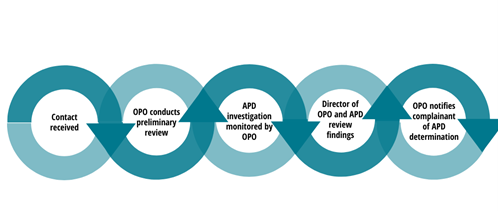
Image 1: 2021 OPO contact stages
Providing positive and negative feedback loops is essential to building trust between the community and APD. Contacts between community members and OPO can originate online, in person, or by phone, email, or mail. A contact may or may not result in a complaint. The number of contacts and compliments the OPO received in 2021 is illustrated in the chart below.
In 2019, the OPO received 1,353 contacts and 158 compliments for APD. In 2020, the OPO received 2,809 contacts and 177 compliments for APD. In 2021, the OPO received 2,239 contacts and 187 compliments for APD. Please note that the significant increase in contacts in 2020 was due to local and national protests against police brutality.
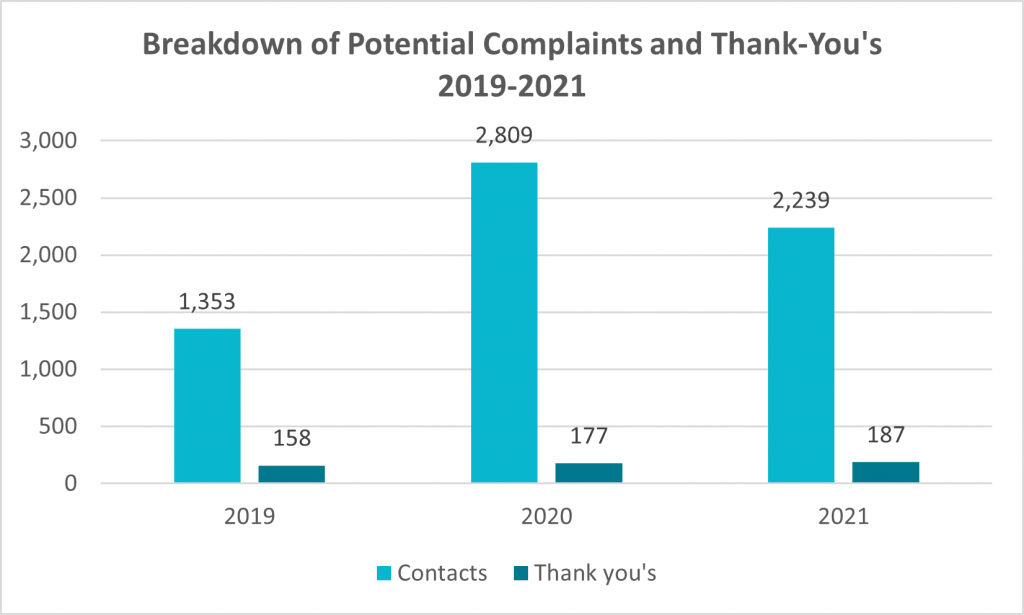
Chart 1: Breakdown of Contacts and Compliments 2019 - 2021
Below is the breakdown of contacts via channel. The OPO continues to receive the majority of complaints via phone calls. In 2019, 1,353 contacts were received, and of those, 1,014 contacts were by phone. In 2020, 2,809 contacts were received, and of those, 1,772 contacts were by phone. In 2021, 2,239 contacts were received, and of those, 1,886 were by phone.
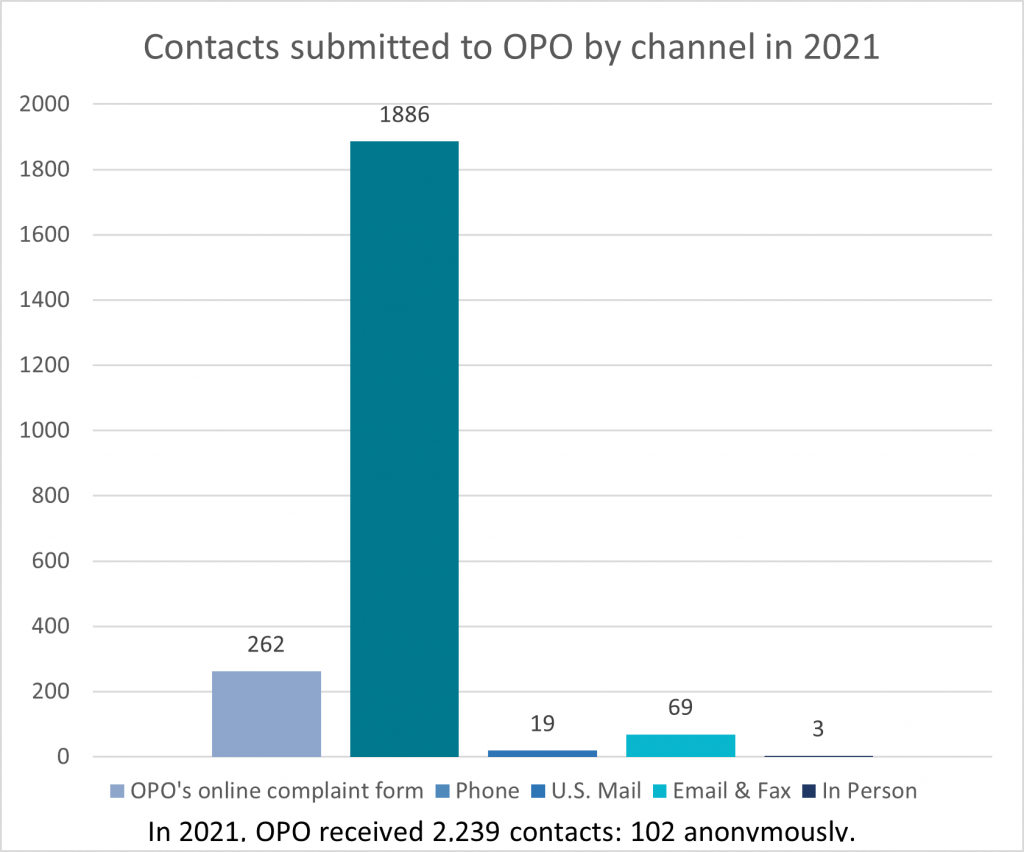
Chart 2: Contracts submitted to OPO by channel in 2021
Complaints Division 2 of 8
What Is the Outcome of an OPO Preliminary Review in 2021?
In 2021, OPO staff reviewed each contact during the preliminary review and processed every complaint in the following ways:
Not Applicable to OPO: OPO may only accept complaints against Austin Police Department (APD) officers. Complaints that are not about APD officers do not apply to OPO.
Community Concern: Community concerns may be a more general concern about police behavior, often lacking details required for OPO to recommend a formal investigation to APD. OPO notifies APD of community concerns.
OPO Supervisor Referral: In some cases, OPO recommends a supervisor referral as the best resolution for a community member. OPO notifies APD of supervisor referrals, and the APD supervisor will contact the community member directly.
Formal Complaint: If OPO identifies potential policy violations during a preliminary review, OPO forwards the complaint to APD and recommends that APD investigate. APD determines whether an investigation will occur. OPO publishes redacted formal complaints on our website.
No Policy Violation: If OPO does not identify a potential policy violation, OPO notifies the community member and closes the complaint.
Complaints Division 3 of 8
How Are Complaints Investigated in 2021?
The Austin Police Department (APD) investigates complaints. There are two different types of complaints: internal and external. Internal complaints are complaints that APD initiates; external complaints originate from the Office of Police Oversight (OPO).
OPO conducted oversight of both internal and external complaint investigations. Specifically, the OPO:
- Reviewed information gathered by APD
- Attended interviews conducted by APD
- Recommended potential policy violation(s) and case classification
- Provided progress updates to the individual who submitted the complaint
- Communicated the outcome of an investigation once APD made a final determination
APD is responsible for determining the case classification of each investigation according to APD policy. APD classifies all complaints, according to their General Orders, as one of the following:
Class A cases where the potential discipline is more than a 15-day suspension, indefinite suspension and/or demotion.
Class B cases where the potential discipline is a 15-day suspension or less. Generally, Class B Complaints are allegations of a less serious nature.
Class C complaints are allegations that do not qualify as Class A or Class B. APD generally does not investigate these complaints.
Class D allegations that do not rise to the level of a general order violation.
Once an investigation is complete, APD has sole discretion for determining the outcome and making a disciplinary decision. OPO does not make any determinations or disciplinary decisions. The possible outcomes of an investigation, according to APD General Orders, are listed below:
- Sustained: When the investigation discloses sufficient evidence to establish that the act occurred and that it constituted misconduct.
- Exonerated: When the investigation discloses that the alleged act occurred but that the act was justified, lawful, and/or proper according to Departmental General Orders.
- Unfounded: When the investigation discloses that the alleged act(s) did not occur.
- Inconclusive: When the investigation discloses that there is insufficient evidence to sustain the complaint or fully exonerate the employee.
- Administratively Closed: Complaints will be administratively closed under the following circumstances: (a) An administrative inquiry has been completed, and no allegations were made, or misconduct discovered. (b) The case was classified as a Class C or Class D complaint. (c) At the discretion of the Chief of Police or designee.
Complaints Division 4 of 8
How Many Complaints Were Investigated in 2021?
In 2021, OPO received 2,239 contacts. After conducting preliminary reviews, OPO forwarded 220 complaints to APD, requesting an investigation. Of the 220, 90 were investigated; 130 were not investigated. Of the 90 that APD investigated, 16 resulted in sustained policy violations.
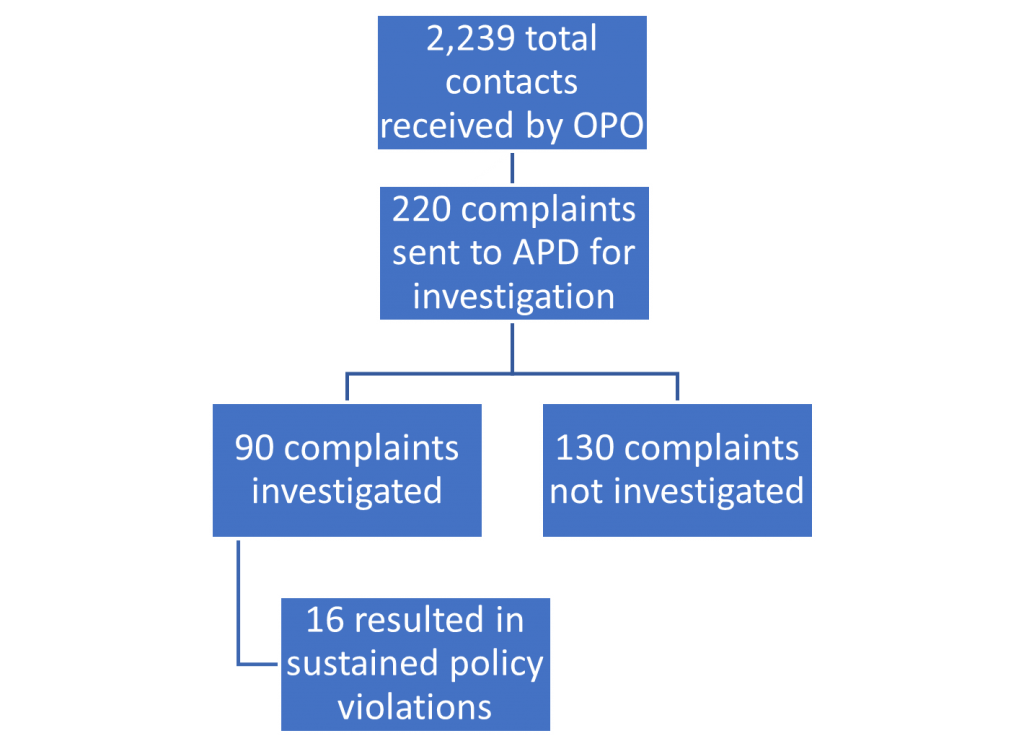
Chart 3: Breakdown of External Formal Complaints
In summary, the 90 external complaint investigations were handled as follows:
- 36 Unfounded
- 16 Sustained
- 15 Administratively closed
- 12 Exonerated
- 8 Pending
- 3 Closed with no action taken
In 2021, 130 internal complaints originated from APD. OPO monitored these investigations and found 114 were investigated, and 16 were closed without investigation. Of the 114 complaints investigated, 60 resulted in sustained violations by APD. Please see the image below for a visual representation of this information.
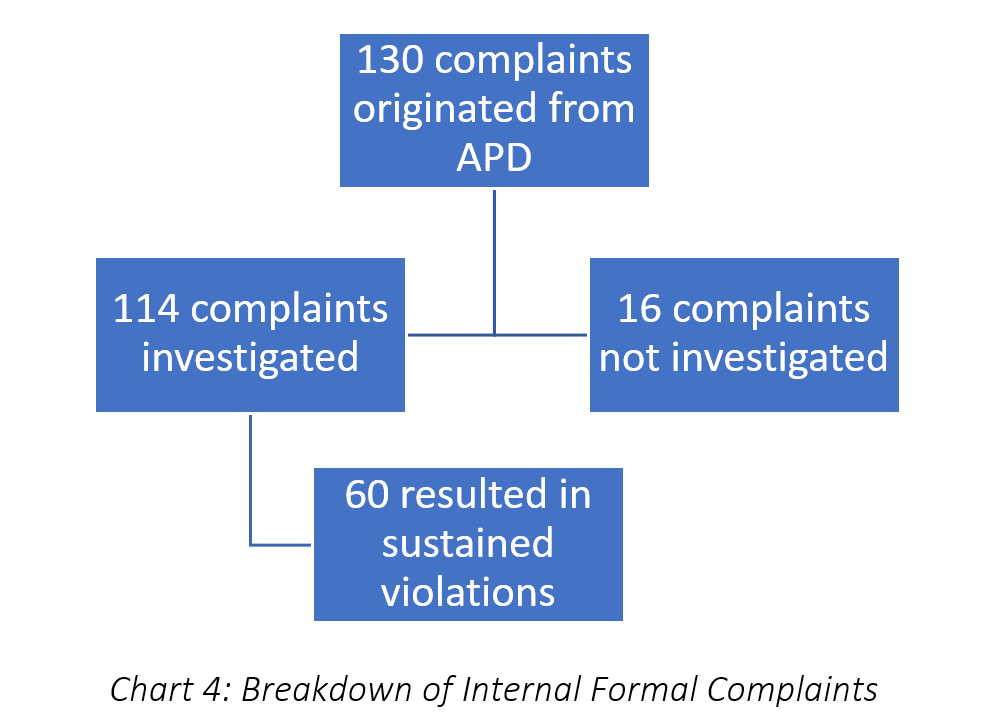
Chart 4: Breakdown of Internal Formal Complaints
In summary, the 114 internal complaint investigations were handled as follows:
- 60 Sustained
- 17 Administratively closed
- 10 Pending
- Nine Closed due to resign/retire
- Eight Unfounded
- Five Inconclusive
- Five Exonerated
Complaints Division 5 of 8
Comparing OPO and APD Complaint Data in 2021
Below is a comparison chart for both OPO external complaints and APD internal complaints. The data below looks at 2019, 2020, and 2021.
In 2019, OPO received 1,353 contacts about potential complaints. A total of 53 were sent to APD as formal complaints for investigation. APD investigated 33 of these 53 formal complaints. APD did not investigate the remaining 20 complaints. Of the 33 complaints that APD investigated, 28 resulted in a sustained policy violations.
In 2020, OPO received 2,809 contacts about potential complaints. A total of 189 were sent to APD as formal complaints for investigation; please note that this does not include protest related complaints. APD investigated 96 of the 189. There were 90 complaints APD did not investigate. Of the 96 complaints that APD did investigate, 52 resulted in a sustained policy violation.
In 2021, OPO received 2,239 contacts about potential complaints. A total of 220 were sent to APD as formal complaints for investigation. APD investigated 90 of 220 formal complaints. APD did not investigate the remaining 130 complaints. Of the 90 complaints that APD investigated, 16 resulted in sustained policy violations.
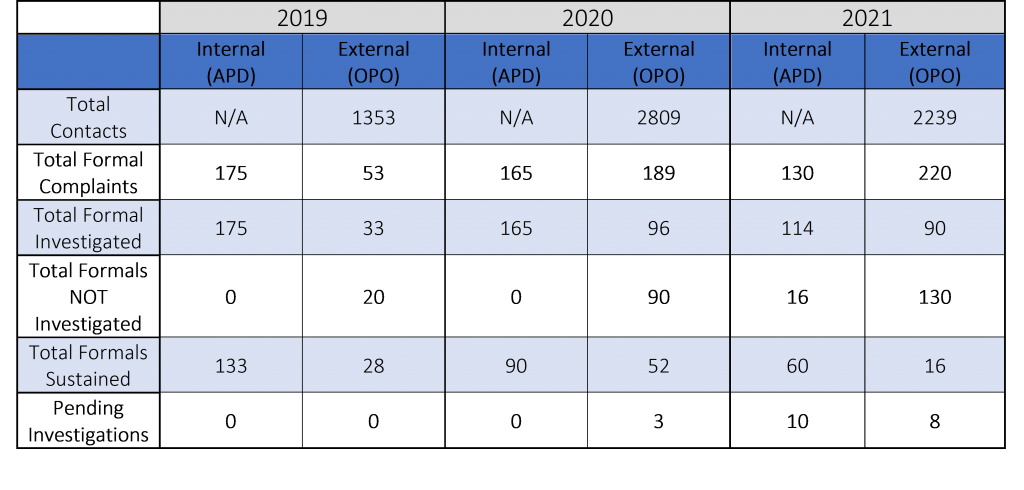
Table 1: Comparison of OPO and APD Complaints 2019 - 2021
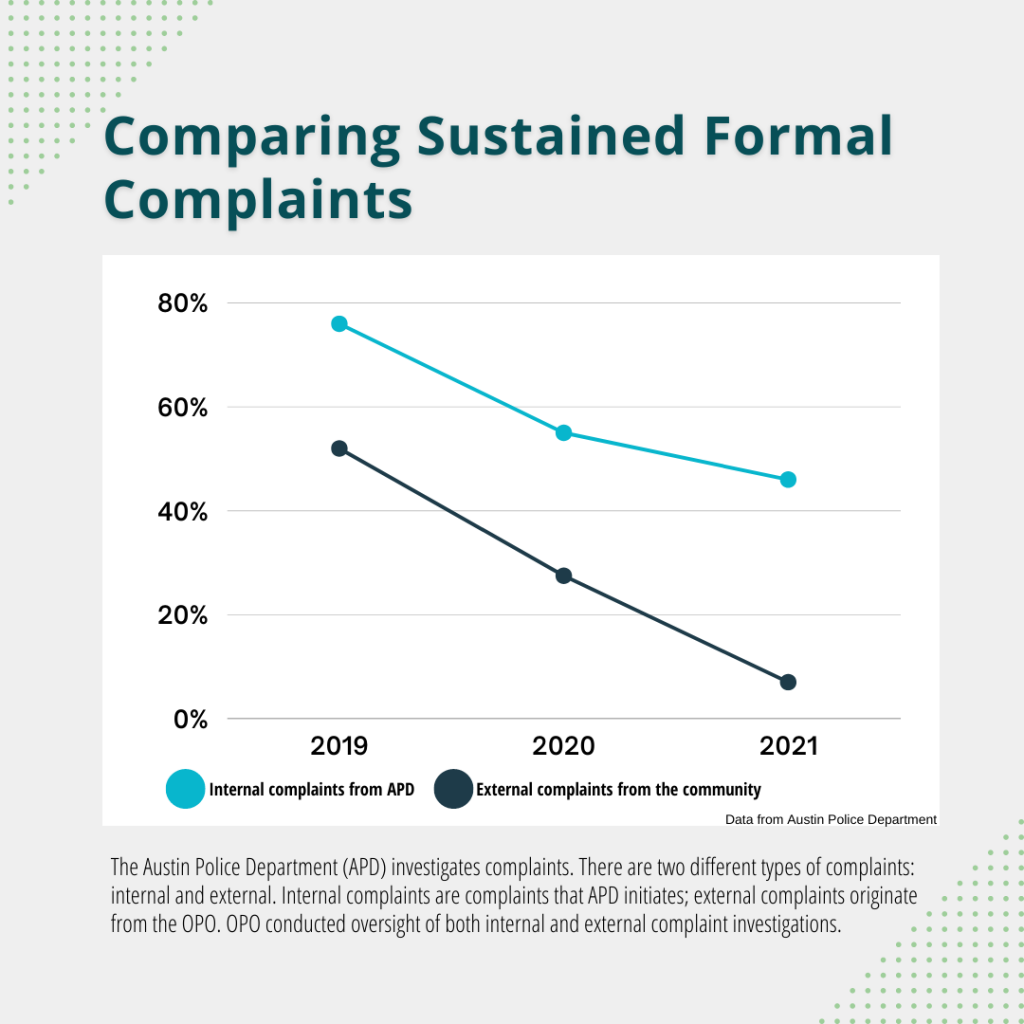
Image 2: Comparing sustained formal complaints in 2021
Complaints Division 6 of 8
What Types of Discipline Did APD Officers Receive in 2021?
Austin Police Department (APD) officers may receive discipline when an investigation reveals that they violated policy. APD can issue discipline the following levels:
- Indefinite Suspension: An officer's employment with APD is terminated.
- Temporary Suspension: An officer is placed on leave for a specified number of days.
- Written Reprimand: An officer is disciplined in writing.
- Oral Reprimand: An officer is disciplined orally.
- Education-Based Discipline: An officer is instructed to attend training as a part of the disciplinary action.
OPO publishes all publicly releasable APD discipline information on our website. In 2021, 86 individual Austin Police Department officers received discipline. There were 72 forms of official discipline issued. Of the 86 officers who were disciplined, 67 were the subject of internal complaints, and 19 were the subject of external complaints. The chart below shows all discipline APD issued to officers in 2021.
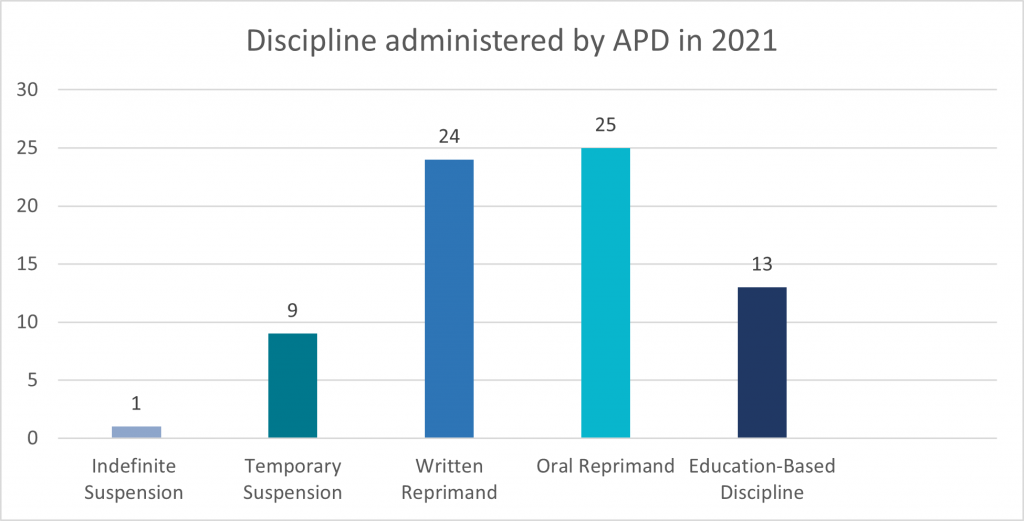
Chart 5: Discipline administered by APD in 2021
During 2021, officers were disciplined most often for policy violations related to:
Department Vehicles – Chapter 804 of APD General Orders
- This was the most cited policy violation for sustained complaints. This policy refers to the general operation of department vehicles.
General Conduct and Responsibilities – Chapter 900 of APD General Orders
- This was the next most common policy violation. This policy category includes acts bringing discredit upon the department and responsibility to co-workers.
Responsibility to the Community – Chapter 3 of APD General Orders
- This policy category includes impartial attitude and courtesy and the required use of body-worn camera.
Incident Reporting and Documentation – Chapter 4 of APD General Orders
- This policy category includes incident reporting and documentation and arrest requirements for assaultive offenses.
Upon review, OPO noted a decrease in discipline issued to officers compared to previous years. See the comparative chart below for data related to 2019, 2020, and 2021.
In 2019, 200 individual Austin Police Department officers received discipline. An officer will be disciplined for more than one policy violation in some instances. During this period, officers were disciplined most often for violations of equipment policies, field operations and custody, response to resistance and pursuit, and field response and investigations and personnel policies.
In 2020, 159 individual Austin Police Department officers received discipline. During this period, officers were most often disciplined for violating field operations and custody policies, equipment policies, personnel policies, response to resistance, pursuit policies, field response, investigations, and reporting policies.
In 2021, 86 individual Austin Police Department officers received discipline. There were 72 forms of official discipline issued.
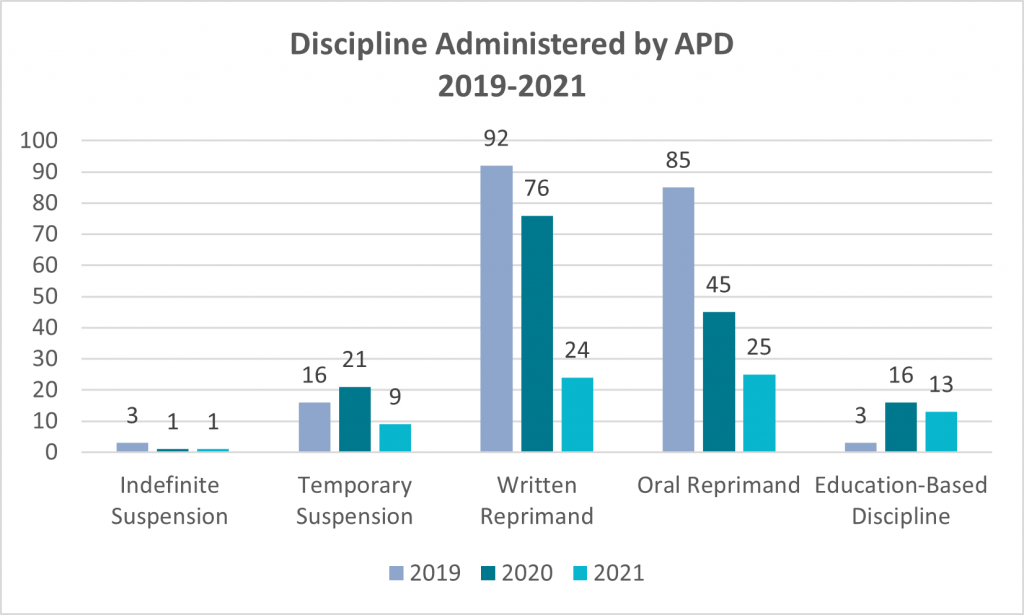
Chart 6: Discipline administered by APD in 2019 - 2021
Complaints Division 7 of 8
Retirements and Resignations Under Investigation in 2021
When an officer retires or resigns under investigation, it ends the investigation and discipline process as it relates to that officer.
- In 2021, 15 officers retired or resigned under investigation.
- In 2020, 11 officers retired or resigned under investigation.
- In 2019, two officers retired or resigned under investigation.
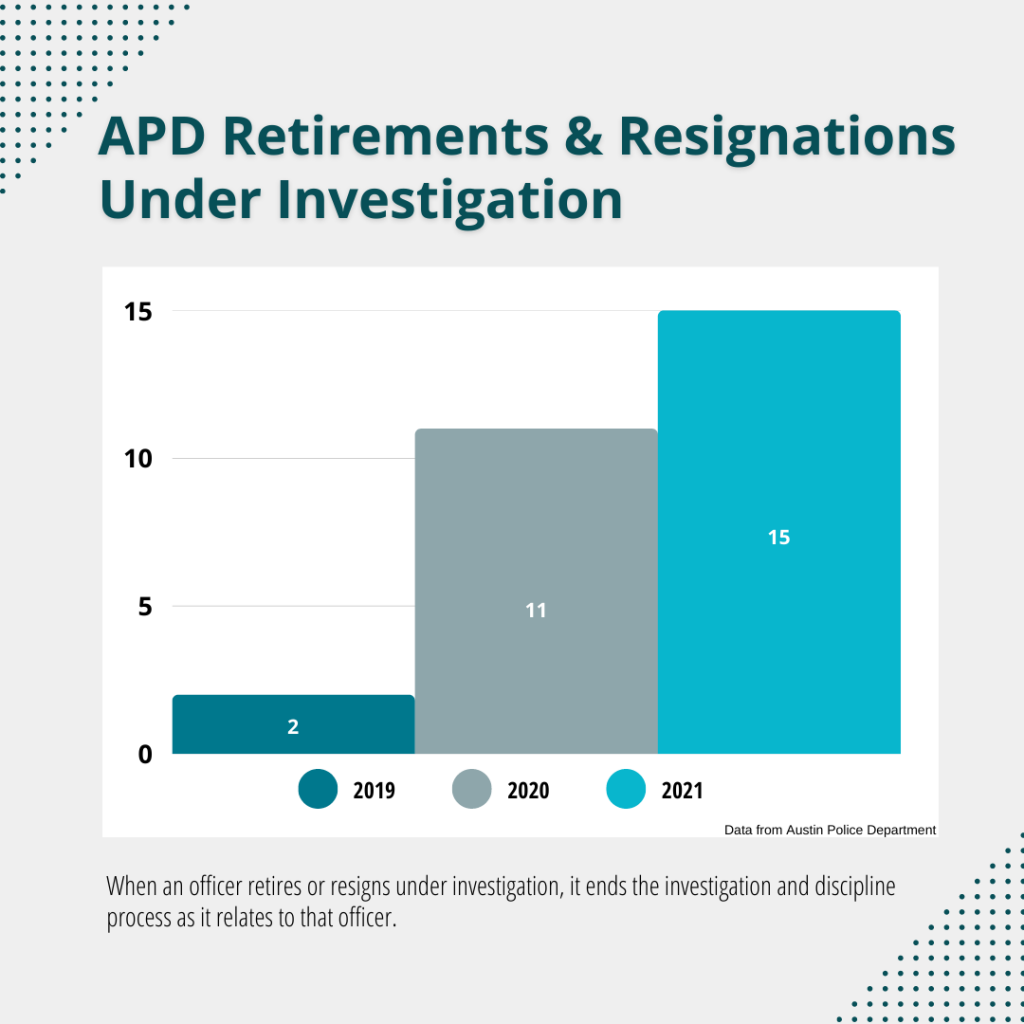
Image 3: APD retirements and resignations under investigation
Complaints Division 8 of 8
Why Are Some Complaints Not Investigated in 2021?
In 2021, APD did not investigate 130 of 220 external complaints from the community. Below are some classifications APD can determine and apply to a complaint.
Administrative Closure
For some complaints, APD determined that there was no policy violation. These complaints were administratively closed without an investigation. OPO objects to APD closing community complaints without investigation.
Officer Final Classification Agreement (OFCA)
The OFCA is an administrative process that allows a complaint to be closed without investigation depending on an officer's history and the nature of the policy violation. Through the OFCA process, APD has determined, without an investigation, that an officer violated policy. OPO objects to APD closing community complaints without investigation.
Supervisor Referral-Minor Policy Violation
APD determined that an officer violated policy for some complaints, though the violation was minor. OPO objects to APD closing community complaints without investigation.
Note: OPO has modified operating procedures within the complaints division due to a December 2021 arbitration decision involving the City of Austin and the Austin Police Association. These modifications will change how OPO reports complaint-related data in future reports.
Policy and Research Division
Policy and Research Division 1 of 5
Policy & Research Division in 2021
The Policy and Research Division conducts rigorous academic, legal, quantitative, and qualitative research to:
- Recommend policy and training changes within the Austin Police Department (APD)
- Report clear and reliable information about APD data and other areas of public concern
- Object to APD practices that negatively impact transparency, accountability, or fairness
OPO believes that the best policies are created with equal attention to research, formulation, and implementation. Additionally, OPO works to ensure an open line of communication between policymakers and the individuals or groups affected by those policies.
Research and analysis are critical to OPO's mission to enhance accountability and increase transparency. The Policy & Research Division reports on the issues that most impact community members' interactions with APD. In some cases, these reports are based on patterns or trends that OPO has observed while processing and monitoring complaints. In other cases, these reports are written in response to specific directions from the Austin City Council or the City Manager's Office.
In 2021, OPO expanded our policy and research work by publishing a series of reports and memos aimed at revising APD policies. Among this work were two comprehensive reports discussing our analysis of APD’s use-of-force policies. OPO also sent a memo to City leadership with recommendations for better defining what constitutes “resistance” and considering alternatives to lethal and less-lethal force options.
Policy and Research Division 2 of 5
Revising the APD General Orders
The policies that govern Austin Police Department (APD) officers are found in a manual called the APD General Orders.
One of the main responsibilities of OPO’s Policy & Research Division is to provide APD with recommendations to improve the General Orders. These recommendations are generally made through one of two processes:
1. OPO recommends a policy change and shares that recommendation in writing with City leadership and APD.
In 2021, OPO made 93 recommendations to APD policies and practices. This included:
- 73 recommendations to change then-current policies or practices
- 20 recommendations to create new policies or practices
2. APD approves a policy change, and OPO responds in writing to either support or object to the change.
In 2021, OPO made 31 objections to APD’s approved changes to 13 policies.
Policy and Research Division 3 of 5
OPO's Recommended Policy Changes in 2021
In June 2020, the Austin City Council passed a series of resolutions aimed at restricting the use of force by law enforcement.
Use-Of-Force Policies
In June 2020, the Austin City Council passed a series of resolutions aimed at restricting the use of force by law enforcement. As part of those resolutions, the City Manager directed OPO to facilitate a rewrite of the Austin Police Department (APD) policy manual, known as the General Orders. The rewrite will cover all policies, including those surrounding issues like search and seizure, body-worn cameras, dashboard cameras, mental health response, discipline, bias, language, and courtesy.
OPO’s Three-Phase Approach
OPO utilizes a three-phase approach to facilitate the rewrite of APD’s General Orders. OPO approaches this rewrite through an open process, seeking feedback and input from the community.
In Phase I, OPO conducts a preliminary analysis of APD’s current policy language on specific topics. The findings from this research are available on atxpoliceoversight.org.
In Phase II, OPO works with community partners and stakeholders to gather input from the public about proposed changes to policies. This outreach effort includes events, surveys, and other forms of community engagement.
In Phase III, OPO submits policy recommendations and community feedback to APD. APD, in consultation with the City Manager’s Office, will review the recommendations.
Reports
In 2021, OPO launched a policy initiative related to APD’s use-of-force policies.
Phase I of this initiative began in September 2020 and ended in January 2021 when OPO published our preliminary report. This report discussed our initial research and recommendations to change APD’s policies on six use-of-force matters:
- Restricting shooting at moving vehicles
- Exhausting all alternatives before using deadly force
- De-escalation
- Duty to Intervene
- Banning chokeholds and strangleholds
- Warning before shooting
OPO’s initial recommendations were based on research into best practices and relevant laws.
Click here to read the preliminary report.
Phase II of this initiative took place between April and May 2021. Phase II involved a community engagement campaign to collect public input on APD’s current use-of-force policies and OPO’s proposed recommendations. For more information on this community engagement campaign, click here.
The final phase of this initiative, Phase III, took place between June and October 2021. This phase of the initiative closed in October 2021 when OPO published our final report. Community voices were at the center of our final recommendations. The report highlighted public input that we received and explained how we incorporated this input, along with current best practices and relevant laws, into our final analysis and recommendations.
Some of our final recommendations included:
- Requiring officers to make every attempt to safely intervene in instances when they observe another officer use or prepare to use force that is not objectively reasonable or engage in any conduct that would constitute a violation of state law, federal law, or APD policy. OPO also recommended that officers who witness or intervene in such an incident immediately report their observations and involvement to a supervisor and complete a written incident report.
- Prohibiting officers from shooting from moving vehicles in all cases and at moving vehicles except if, based on the totality of the circumstances, officers have exhausted all possible alternatives and
- An occupant of the vehicle is using or immediately threatening deadly force by means other than the vehicle itself or
- If the vehicle itself is being used as a weapon, that will more likely than not cause a Mass Casualty Incident (e.g., driving into a crowd of people)
- Prohibiting the use of chokeholds, strangleholds, and any other action that could, or is intended to, prevent, reduce, hinder or otherwise negatively impact an individual’s blood flow to the brain or intake of air.
Click here to read the final report.
Presentations
In April 2021, OPO presented our initial use-of-force recommendations at the 8 Can’t Wait Town Hall event hosted by the City of Austin’s Community Police Review Commission.
In July 2021, OPO presented our initial use-of-force recommendations to the City of Austin’s Public Safety Commission. Click here to view this presentation.
Policy and Research Division 4 of 5
Protest-Related Policies
In June 2020, the Austin City Council passed a series of resolutions to respond to issues that arose during the George Floyd protests in the summer of 2020.
One of these, Resolution 20200611-095 (“Resolution 95”) (PDF, 279 KB), outlined the City of Austin’s position on several use-of-force topics.
In early 2021, as a result of Resolution 95, APD considered changes to its policies on some of these topics, including:
- Tear gas
- Facial recognition technology
- Long-range acoustic devices
- Military-grade equipment
- No-knock warrants
OPO found that APD’s proposed changes to four of these five topics did not align with Resolution 95.
Redefining “Resistance” and Considering Alternatives
In June 2020, the Austin City Council adopted Resolution 20200611-095 ("Resolution 95"). Pursuant to Resolution 95, the City Manager directed the Office of Police Oversight to "research and issue recommendations on amendments to the Austin Police Department (APD) General Orders on how to better define what constitutes 'resistance' and alternative tactics and tools that can be used by officers to prevent the need for lethal or less-lethal munitions, including a review of police techniques used in countries that use unarmed patrol forces."
Less-lethal munitions are projectiles fired from a launcher, such as a 12-gauge shotgun. Examples of less-lethal munitions include pepper balls, beanbag rounds, and rubber bullets. Less-lethal munitions can cause injury, incapacitation, or death.
Lethal munitions are ammunition projected from a traditional firearm such as a pistol or rifle. Examples of lethal munitions include traditional bullets. Lethal munitions can cause injury, incapacitation, or death.
On April 15, 2021, OPO released a policy memo discussing how resistance could be redefined and considering alternative tactics and tools to prevent the need for lethal and less-lethal munitions.
One of our main findings was that the current General Orders do not define the term “resistance,” nor do they provide examples of behavior that would be considered “resistance.”
Policy and Research Division 5 of 5
OPO Responses to APD's Policy Changes in 2021
In 2021, OPO made 31 objections to APD’s approved changes to 13 policies. The table below lists the policy topics addressed in OPO’s objections and summarizes our main recommendations.
OPO’s June 15th Memo (Click here to view full memo)
Language Interpreter Service (General Order 609.2)
OPO recommended that APD policy be revised to require the use of the Language Interpreter Service when interpretation is necessary to provide services to the public. The current policy language only states that the Service “should” be used; it is not required.
Externally Initiated Complaints (General Order 902.2.3)
OPO recommended that APD policy be revised to require officers to provide complainants with their names and badge numbers if the complainant has made an on-scene complaint but is not able to wait for a supervisor.
Department Hardware and Software (General Order 1000.5)
OPO recommended that APD policy be revised to define the terms used, including “facial recognition technology,” “facial recognition software,” “facial recognition services,” “law enforcement purposes,” “criminal investigative purposes,” and “surveillance purposes.”
Destruction of Criminal History Record Information (General Order 118.7.2)
OPO recommended that APD policy be revised to provide details about APD’s tracking and logging procedures for the destruction and sanitization of electronic media, as well as details as to where the Department’s records control/retention schedules can be found.
Verbal Warnings for the Use of Kinetic Energy Projectiles (General Order 206.5.2)
OPO recommended that APD policy be revised to provide a clearer standard for when verbal warnings are required and stop using “impacting” as the verbal warning prior to firing kinetic energy projectiles. This term is police jargon and is not widely understood by the public.
Pain Compliance Techniques (General Order 206.6)
OPO recommended that APD policy be revised to require officers to consider factors such as age, physical size, physical condition, mental health, number of officers assisting, etc.
Proper Maintenance of TASER Devices (General Order 208.7.1)
OPO recommended that APD policy be revised to require that any TASER defect found by an officer be reported to the supervisor immediately and preferably in writing.
Use of Long-Range Acoustic Devices (General Order 300.3.1)
OPO recommended that APD policy be revised to include more specific guidance related to time, place, and manner restrictions to assist officers in navigating First Amendment issues.
Copies of Body-Worn Camera Recordings (303.4.2)
OPO recommended that APD policy be revised to outline the specific General Orders sections that reference records retention or refer readers to the Office of the City Clerk and the City of Austin’s Public Records Access – Online Document Search
Consent Searches (General Order 306.5)
OPO recommended that APD policy be revised to restore the previous policy language requiring that consent searches be executed only by officers who have received supervisor approval or are assigned to specific units and have received specific training. These requirements add additional levels of review and consideration to help prevent overuse and proper execution.
Warrant Service Guidelines (General Order 319.2.1)
OPO recommended that APD policy be revised to define the acronym “MRE,” which is used periodically throughout the General Orders but never explained or defined.
Vehicle Towing and Impound (General Order 350)
OPO recommended that APD policy be revised to define what constitutes an “item of value” and require that, in addition to verbal documentation on body-worn camera, officers provide a written record of vehicle damage and personal property located during the inventory of an impounded vehicle.
OPO’s August 19th Memo (Click here to read the full memo)
Utilization of NARCAN (General Order 415)
OPO recommended that APD policy be revised and restructured to provide more clarity, including clearer and more thorough definitions of “opioids” and “naloxone."
Communications and Community Engagement Division
Communications and Community Engagement Division 1 of 2
Communications and Community Engagement Division in 2021
The communications division consists of communications and community engagement professionals who bring the work and services of the Office of Police Oversight to the community in an accessible, transparent manner.
How the Communications Division Strives to Bridge the Gap Between Austin Police and the Community
In 2021, OPO’s communications and community engagement division:
- Hosted five community events to gather feedback from community members and document their lived experiences
- Attended 41 community events to connect with community members
- Provided educational presentations at 20 community meetings
- Received more than 68,000 website views
Our Community Engagement Strategy
How We Engaged Diverse Populations Across Austin
The Office of Police Oversight’s communications and community engagement team uses a framework that prioritizes consultation and collaboration with the community while providing education on resources and services. Our community engagement team centers our work around listening to community members’ feedback and encourages them to work alongside our office to create change and deepen understanding.
In 2021, OPO engaged community members to discuss topics such as:
- How to file a complaint or compliment
- Feedback on APD’s current policy manual
- The unique experiences people with disabilities have when interacting with APD

Image 4: OPO's community engagement strategy in 2021
Transparency at the Heart of Our Work
OPO’s communications and community engagement team leverages traditional and digital media to promote our work to the community.
- We create how-to videos to educate community members about OPO’s services and resources (click here to view the video).
- We publish bi-monthly newsletters with the latest opportunities for community members to engage in transforming public safety.
- We publish Medium articles to provide background on how we approach our work.
Collaborating With the Community
Our Framework in Action: Collaborating with the Community to Reform APD Use-of-Force Policies
In May 2021, the Office of Police Oversight (OPO) asked community members what they thought about six of the Austin Police Department’s (APD) use-of-force policies. Specifically, how they should (or shouldn’t) apply to local communities and if they should change. OPO’s goal was to develop policy recommendations and solutions for a safer Austin with community feedback.
OPO created a survey and a virtual event series to get community feedback on six policy areas. Learn more about the initial report here (link to policy section). The survey and virtual sessions were multilingual: English, Spanish, and American Sign Language. During the virtual event series, OPO presented the six policies and provided a space for the community to give real-time feedback.
Altogether, community members submitted more than 1,400 surveys with more than 2,200 comments. After synthesizing these responses, OPO integrated them into the final policy recommendations published in this report.
Centering Community Members
Prioritizing Accessibility in Our Work
In 2021, OPO developed a plan to engage community members to learn more about the experiences of people living with disabilities and their interactions with law enforcement. On May 21, 2021, in collaboration with the Mayor’s Committee for People with Disabilities, the Mayor’s Office, and the Equity Office, OPO hosted the Town Hall on Public Safety: People with Disabilities and Policing. The event was the product of collaboration with several community partners who provided expert consultation to ensure accessibility and inclusivity.
The event was held virtually and offered closed captioning and interpretation in American Sign Language, Spanish, and Vietnamese. Forty-two community members participated, including individuals with lived experiences, care providers, and community members who wanted to listen and learn. Notetakers at the event recorded responses and feedback shared by community members. After conducting a data synthesis on this feedback, OPO published a community feedback report including key findings and next steps.
Making Accessibility and Language Access a Pivotal Component of Our Workflow
Listening to community feedback has allowed us to learn from individuals with lived experience who were able to shed light on the importance of accessibility and language access. Our office has learned from the public and has been committed to making these factors a non-negotiable element in our work, including but not limited to social media, reports, events (virtual and in-person), and website content. Our office participated in multiple professional training seminars to learn more about best practices to improve accessibility in our marketing and communications materials.
In addition to attending training, language access is implemented into our workflow. By translating our materials into Spanish and other languages, we ensure that community members can access our information without sacrificing the convenience of the overall experience of using our website.
Communications and Community Engagement Division 2 of 2
2021 Community Police Review Commission (CPRC)
The CPRC is a group of volunteers appointed by the City Manager as another tool for accountability and transparency in policing.
Commission Updates
The CPRC is a group of volunteers appointed by the City Manager as another tool for accountability and transparency in policing. Commissioners can:
- Make policy-level recommendations regarding discipline, training, community relations, and the Office of Police Oversight's (OPO) complaint process
- Address any other issues of concern by the community
- Review patterns and practices of the Austin Police Department (APD)
- Assess critical incidents and review individual cases of police misconduct
- Make fair and objective recommendations, and make decisions based only on the facts and evidence
- Assess the effectiveness of OPO
The Office of Police Oversight provides administrative support to the Community Police Review Commission. In 2021, the CPRC hosted 15 public meetings and developed seven recommendations for the Austin Police Department. Their recommendations include proposed changes to APD's racial equity policies, mental health training, and the General Orders. They also provided recommendations regarding critical incident cases the commission has reviewed. You can access these official recommendation documents and learn more about commission updates on their website, austintexas.gov/community-police-review-commission.

